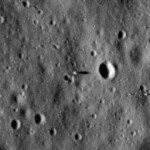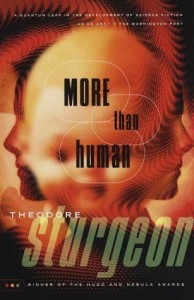July 20th, 2009 marks the 40th anniversary of the day when the only life we so far know to exist, having left its home planet and having focused for a moment into the form of a human being named Neil Armstrong, first strode across the soil of another celestial body. When life stepped off the ladder of the frail little Apollo 11 spacecraft called the Eagle and onto the surface of the Earth’s Moon. The 55-second video clip embedded below replays Armstrong’s first step and first lunar words as at least 600 million people on Earth experienced them televised live in 1969.
If you’ve been frantically calculating the angular momentum and the who’s torquing whom of current-events soundbyte spin — take a break. You can return to the various expectorations about the empathy of a “wise Latina” later, you can compare her empathy to the peculiar sentiments of Joe the Plumber later. But right now — do yourself a favor. Quest for no-spun reality by decoding a message which instead points toward the widest horizon, where empathy springs not just from considering gender and race, but from reverencing all life, reverencing all the universe.

Hubble Deep Field: Wherein magnification of just 0000000.7th of the sky above you reveals 10,000 galaxies, 123 quintillion stars
What was the message Neil Armstrong gave the universe after he stepped onto the Moon? We, including Armstrong, know what he intended: “That’s one small step for a man, one giant leap for mankind.” Pure poetry, composed workaday — in the biography First Man, Armstrong recounts the line’s invention to author James R. Hansen:
[W]hat can you say when you step off of something? Well, something about a step. [The line] just sort of evolved during the [roughly six-hour] period [after landing on the Moon] that I was doing the procedures of the practice takeoff [as if to return to the command module orbiting above] and the [Extra-vehicular Activity] prep and all the other activities that were on our flight schedule at that time. [… It] wasn’t much of a jump to say what you could compare [a step] with.

Wherein the 2009 Lunar Reconnaissance Orbiter has photographed the base of the Eagle spacecraft still sitting on the Moon (center of photograph, with horizontal shadow)
The morning after the moon landing, The New York Times reported Armstrong’s famous line as “That’s one small step for man, one giant leap for mankind.” According to the Times, then, and also according to many other ears, Armstrong left out the ‘a’ in ‘for a man.’ Which would render his line equivalent to “That’s one small step for mankind, one giant leap for mankind.” A frustrating contradiction. Armstrong might have thrown up his hands a few years ago when he told biographer Hansen:
For people who have listened to me for hours on the radio communication tapes, they know I left a lot of syllables out. It was not unusual for me to do that. I’m not particularly articulate. Perhaps [the ‘a’ in ‘for a man’] was a suppressed sound that didn’t get picked up by the voice mike. As I have listened to it, it doesn’t sound like there was time for the word to be there. On the other hand, I think that reasonable people will realize that I didn’t intentionally make an inane statement, and that certainly the ‘a’ was intended, because that’s the only way the statement makes any sense. So I would hope that history would grant me leeway for dropping the syllable and understand that it was certainly intended, even if it wasn’t said — although it actually might have been. [… Historians] can put it in parentheses.
Today you get all kinds nudging you with their elbows and half-whispering, “Do you know what Neil Armstrong really said?” A setup for their gloating found-feet-of-clay punch: “He flubbed his line!!! He really said — ” and on and on.

Pale Blue Dot: Wherein from a distance of 3.7 billion miles, sunlight scattered off the Voyager 1 probe puts the Earth and you into the universe
But in 2006, after his decoding of the Apollo 11 recording with GoldWave software, a computer programmer named Peter Shann Ford reignited the discussion over what Armstrong said. The Houston Chronicle reported that “According to Ford, Armstrong spoke, ‘One small step for a man …’ with the ‘a’ lasting a total of 35 milliseconds, 10 times too quickly to be heard.” One person who stepped into the debate was Wina Sturgeon, who in 1969 was married to Theodore Sturgeon, author of the glorious 1953 novel More Than Human, the underlooked 1986 novel Godbody, the 1953 short story collection E Pluribus Unicorn, and many other works. In 2007 Wina Sturgeon discussed her memory of Armstrong’s words for ABC 4:
Neil Armstrong’s alleged first words on the moon are now deciphered by modern technology as grammatically correct […] My husband was a science fiction writer. The moon landing was as important to him as [our unborn] child […] was to me; but then, in some mysterious way, the two became connected in my mind; the child that would come out of me and the astronauts that would come out of the ship and walk on the moon.
It ain’t over ’til it’s over, and not even then. Many questioned the accuracy of Ford’s discovery; Eric M. Jones, for one, in his formidable Apollo 11 Lunar Surface Journal for NASA, disagrees with Ford:
In 2006, with a great deal of attendant media attention, journalist/entrepreneur Peter Shann Ford claimed to have located the ‘a’ in the waveform of Neil’s transmission. Subsequently, more rigorous analyses of the transmission were undertaken by a number of people, including some with professional experience with audio waveforms and, most importantly, audio spectrograms. As of October 2006, none of these analyses support Ford’s conclusion.
My take? The embedded 7-second audio clip below plays my 88% slow-down of Neil Armstrong’s “for a man” phrase as well as the phrase spoken at regular speed. If you listen very closely — and listen to it loud — and listen again, maybe believing a little, you can hear Armstrong automatically transform, with his northwestern Ohio boy accent, “for a man” to “furuh man.”
If you must pat yourself on the back and straitjacket Apollo 11 into the context of jingoism and the Cold War and the military machine, go ahead; if you must quarrel about Armstrong saying ‘mankind’ and not ‘humankind’ or ‘life,’ go ahead; however accurate you might be, you are right now spinning away, too accelerated to pause for the perspective of the universe as braved in 1969. As you exit, let me send you with a note explaining that in less than a billion years, as the sun burns more and more fiercely, the Earth (unless we move it!) will be hotter than boiling water and will have no atmosphere; in 7.6 billion, the sun, by then a red giant, will swallow the Earth. Those of us who have taken the perspective of the universe care not just about the present but also about the farthest future. Where will life go?
Asking such a question, listening closely, we have herein slowed spin sufficiently to decode Armstrong’s message. We know Armstrong’s intention, at the very least. “That’s one small step for a man, one giant leap for mankind.”
What might it mean?
It’s not symptomatic of some ultimate white flight. I say Armstrong’s combination of the provincial and the cosmopolitan, the timely and the universal, points us toward the deepest empathy. Wherein we know ourselves, and without losing our individual identity — a northwestern Ohio accent or another accent adding to the great universal jam session — we blesh with the identities of others, especially those we dislike, working to understand, to reverence all things.
Just like these folk in Holland 1979, jamming out to the universe:
Blesh? The neologism comes from Theodore Sturgeon’s novel More Than Human. If you, like The New York Times, still need to ask if someone can “write about spaceships and monsters and alien civilizations and still be a great American writer?”, then pay especial attention.
To “blesh,” Sturgeon writes, means “everyone all together being something, even if they all did different things. […] Lone said maybe it was a mixture of ‘blending’ and ‘meshing,’ but I don’t think he believed that himself. It was a lot more than that.” As Crawdaddy! creator, rock journalist, science-fiction chronicler Paul Williams writes in his online essay Theodore Sturgeon, Storyteller:
Crosby, like most mid-Sixties’ rock musicians (and underground press editors, political activists, dope impresarios, etc.), was an avid reader of science fiction in general and Sturgeon in particular; and he realized early that the Byrds and other rock groups were living examples of Sturgeon’s idea that a group of humans could function as more than the sum of the individuals involved … not just more, but mystically more, so that the group took on its own personality and created things that none of its individual members could even have imagined. Chester Anderson wrote in the San Francisco Oracle in 1966, in a widely reprinted analysis of the new rock or “head” music, “Rock is evolving Sturgeonesque homo gestalt configurations…..” The Merry Pranksters were another example of the same phenomenon, as were all the nameless groups that came together to organize political or cultural events and then disbanded and vanished when the work was done.
[…] Sturgeon, in More than Human and throughout his work, is a moralist as well as a visionary. Not the kind of moralist who knows what’s right and what’s wrong and tells you in so many words, but the kind who is searching for the answers and shares his search with his readers. […] Sturgeon’s answer is awkward and incomplete, but, for our generation, much more appropriate than Nietzsche’s.
(Paul Williams now requires full-time medical care; his website asks for donations.)
And as to the “wise Latina”? For all the Congressional insistence that a judge not be “activist,” for all the expectorations asserting that “the” law must be mechanistically applied by “impartial” judges, Edward H. Levi makes clear in An Introduction to Legal Reasoning that legal reasoning is necessarily activist, and imperfect, which is why it works so well. What we want on the Supreme Court bench and elsewhere in the universe is the broadest, deepest empathy. Even the George W. Bush-appointed Justice Sam Alito said “in immigration and naturalization cases” he “can’t help but think” of his “own immigrant ancestors,” and he said “When I get a case about discrimination, I have to think about people in my own family who suffered discrimination because of their ethnic background or because of religion or because of gender. And I do take that into account.”
Good science fiction — or, given Apollo, science fact — sends out a message calling for empathy. Life moves forward toward the perspective of the universe. Signing off this message with a description of that perspective from More Than Human:
[This] ethos will give you a code for survival too. But it is a greater survival than your own, or my species, or yours. What it is really is a reverence for your sources and your posterity. It is a study of the main current which created you, and in which you will create still a greater thing when the time comes. […]
And when their morals no longer suit their species, you or another ethical being will create new ones that vault still farther up the main stream, reverencing you, reverencing those who bore you and the ones who bore them, back and back to the first wild creature who was different because his heart leapt when he saw a star.


 Twitter:
Twitter:
Join the conversation